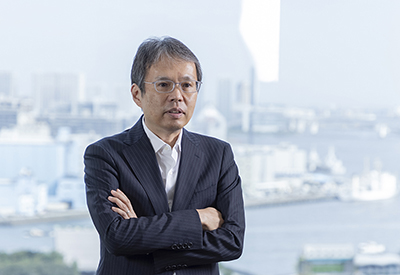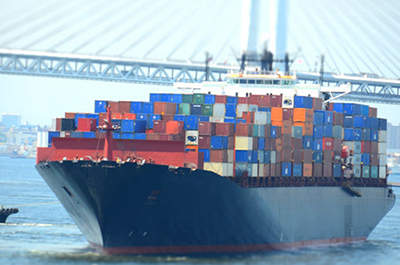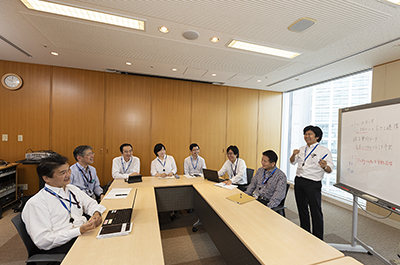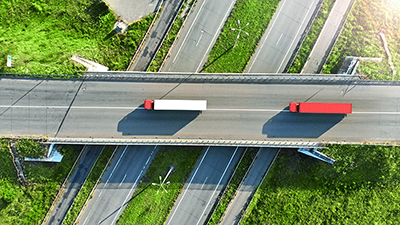*This content was paid for and produced by Nippon Express in partnership with the Commercial Department of the Financial Times.
Full steam ahead for Nippon Express’ maritime forwarding
November, 2021
- ― Charting growth in tempestuous times
-
Global maritime forwarding continues to face turmoil from waves of pandemic-related disruption, but the sector is finding new opportunities in its wake.
 Shinichi Kakiyama, Executive Officer for Nippon Express
Shinichi Kakiyama, Executive Officer for Nippon Express
- After an initial drop-off, international shipping volumes rebounded sharply from the second half of 2020. Demand for consumer goods, led by Western consumers cooped up at home buying goods online manufactured in Asia, has surged. Combined with robust trade volumes in other key sectors such as semiconductor and automotive, global cargo shipments for 2021 have risen above pre-Covid levels. But a severe shortage of containers, combined with port congestions from Covid-19-related lockdowns, have caused delays in deliveries and soaring freight rates.
- As shippers scramble to secure cargo space and find new routes, an unexpected window for growth is presenting itself for forwarders. One such company on the rising tide is Nippon Express, Asia’s largest service provider and among the world’s largest global logistics service providers.
- “As a result of the disruptions from Covid-19, we are seeing an increase in queries from customers realising the value of forwarders such as us,” says Shinichi Kakiyama, executive officer for Nippon Express and at the helm of the group’s maritime forwarding strategy. “One reason these customers are reaching out to us is that Nippon Express provides a wide lineup of solutions combining sea, rail, and air services, together with various logistics services, throughout our global network.”
- The latest developments are timely for the company, which has prioritised expansion of its maritime forwarding business for the whole group in its mid-term growth plan, “Dynamic Growth”, announced in 2019.
- With over 80 per cent of all international cargo being sent by sea, maritime forwarding is at the core of supply chains for most companies. Nippon Express identifies close involvement in customers’ maritime forwarding as indispensable to capture clients’ broader transport and warehousing needs, as well as derivative air cargo needs, before and after shipment by sea.
- “Providing maritime forwarding services will enable us to develop deeper relations with our customers and understand how they wish to optimise their supply chains,” says Kakiyama. “Ultimately we hope to become as competitive as the European mega-forwarders in buying power and securing cargo space.”
- Although dominant in Japan and highly competitive in Asia-origin routes, Nippon Express still lacks the vast scale of its largest competitors which handle multiple million TEUs (20-foot container equivalent units) annually. Nippon Express aims to increase its handling volume to over 1.3m TEUs per year by 2023 from some 660,000 in 2020 and count itself among the top-five global maritime forwarders in the future.
- ― A global engine for forward propulsion
-
In the coming year, the company will be taking a major step towards this ambitious goal. It plans to transfer its recently established GNC (Global Non-vessel Operating Common Carrier Center) to Singapore to accelerate sales and standardise operations in its global freight forwarding business.

- By centralising operations such as pricing previously controlled at a regional level, the GNC will provide three new functions with various benefits, says Kakiyama. First, it will enable the company to pursue joint-purchasing and negotiate better rates and secure space from carriers. As one of the three largest ports in the world, Singapore is home to numerous global carriers’ pricing centres as well as the Asia-Pacific headquarters for many shippers. GNC will connect the two.
- The other two functions relate to improving operational efficiencies by standardising and digitalising services globally through the GNC. These include measures such as establishing digital platforms for bookings and estimates for customers as well as forming EDI (electronic data interchange) links with carriers.
- “Placing the GNC in Singapore is also ideal to keep abreast of the latest market developments and hire the additional staff needed to internationalise and more effectively approach potential non-Japanese clients,” says Kakiyama.
- In fact, Nippon Express’ Global Key Accounts division in Singapore comprised wholly of non-Japanese staff has already been knocking on the doors of the offices of major Western companies. This strategy of internationalising its staff, particularly at executive level, for local operations has been ongoing elsewhere, including many of the Western markets in which the company operates.
- There are signs that such efforts are paying off. “We are gradually being called to more international bids and expanding the base of our business to non-Japanese clients,” says Kakiyama.
- In terms of geography, the company will strengthen its presence in east and south-east Asia while expanding into other growth regions such as India, the Middle East, Africa, and central-eastern Europe. Sector-wise, the focus is on the five domains of semiconductor, pharmaceutical, automotive, electronic, and high fashion. Besides these, Nippon Express is eager to boost freight volumes in the burgeoning trade for FMCG (fast moving consumer goods), especially those originating from Asia.
- The past few years has also seen a steady stream of M&A activity – for example the purchase of Italian Traconf in 2018 and US MD Logistics in 2020 – to strengthen its presence in the above areas. In addition, the company is eyeing acquisitions of companies that possess the kind of technologies and assets which may prove game-changing for the future of logistics, including maritime shipping.
- ― Putting wind into the sails of clients
-
“What differentiates us from other major forwarders is that we have focused not on capturing volume through commodifying services, but by engaging closely with the logistics challenges faced by our clients,” says Kakiyama. “What we call Nippon Express’ quality – be it in terms of accuracy, speed, and flexibility – developed through accumulated knowhow through close relationships with customers over the years.”
 Shigenobu Furusawa, general manager,
Shigenobu Furusawa, general manager,
Apparel Group, International Ocean Cargo Division,
Forwarding Business Unit, Kanto-Koshinetsu Region,
Nippon Express - For example, one of the company’s major accounts – a global retailer– has increased annual cargo volumes by 10-fold over the past decade as it expanded successfully into newer markets abroad.
- Nippon Express’ support, explains Shigenobu Furusawa, general manager, Apparel Group, International Ocean Cargo Division, Forwarding Business Unit, Kanto-Koshinetsu Region, Nippon Express helped the FMCG brand to ship thousands of unique products to dozens of countries worldwide from factories spread across Asia.
-
By gaining up-to-date advice on rapidly changing and complex local import regulations through Nippon Express’ network of local staff, the retailer was able to avoid replicating such capacity in-house, a tricky task, or outsourcing to a consultancy, a costly option. The client has also unified all global NVOCC contracts, including those using sea and air routes, as well as cargo shipped between third countries, to Nippon Express through exclusive contract.
 Forwarding Business Unit, Kanto-Koshinetsu
Forwarding Business Unit, Kanto-Koshinetsu
Region, Nippon Express - “International forwarding in retail products is challenging as it is highly volatile in volumes and seasonal,” says Furusawa. “But through this long-term partnership with this particular retailer, we have a successful case under our belt and invaluable insights to expand further in FMCG.”
- ― Many lanes and routes to choose from
- Besides such know-how, Nippon Express also has an edge in the diversity of multimodal solutions it can offer as a global forwarder. The past 18 months of pandemic-led convulsions in sea and air cargo provided ample proof of the company’s agility. Demand for services on Nippon Express’ routes connecting south-east and east Asia to Europe using sea and rail skyrocketed, with cargo volumes on the company’s Eurasian rail services expected to double in 2021 to over 7,000 TEUs.
- When this flood of Eurasian cargo rail traffic led to bottlenecks at Polish and Belarussian borders, the company quickly adapted by using a high-speed alternate route via Kaliningrad to Germany. With continued congestion in ports on the US west coast, the company is now considering a new service to connect Asia to North America via Eurasian rail and shipping across the Atlantic to the US east coast.
-
These services may initially start as emergency measures undertaken during the pandemic but look likely to persist.

- “We are seeing customers who are incorporating Eurasian sea-and-rail routes into their standard supply chain plans, and it’s not just the traditional automotive makers who are doing that, but a range of sectors,” says Kakiyama. “We believe such demand will continue to grow, including from the perspective of reducing carbon emissions since rail transport has a smaller environmental impact.”
- Another reason why shippers may look towards the Japanese logistics giant is that the forwarder does not only forward freight but also boasts a global network of logistics centres, enabling vital adjustments such as increasing temporary warehousing to ease the strain on disrupted supply chains. As the blockage of the Suez Canal in March of this year highlighted, shippers have realised the vital need for the kind of agile logistics solutions which companies like Nippon Express can offer.
- “As a result of the pandemic, we have reconfirmed our own mission to find new routes, secure cargo space, and provide information to both ends of the shipment. That’s the way to keep the vital flow of goods around the globe unstopped,” says Kakiyama.
- Although global shipping supply chains look likely to remain choppy for the near future, “a smooth sea never made a skillful sailor”. Already Nippon Express has proven to be expanding its capabilities as a maritime freight forwarder and delivering new solutions for those at sea.